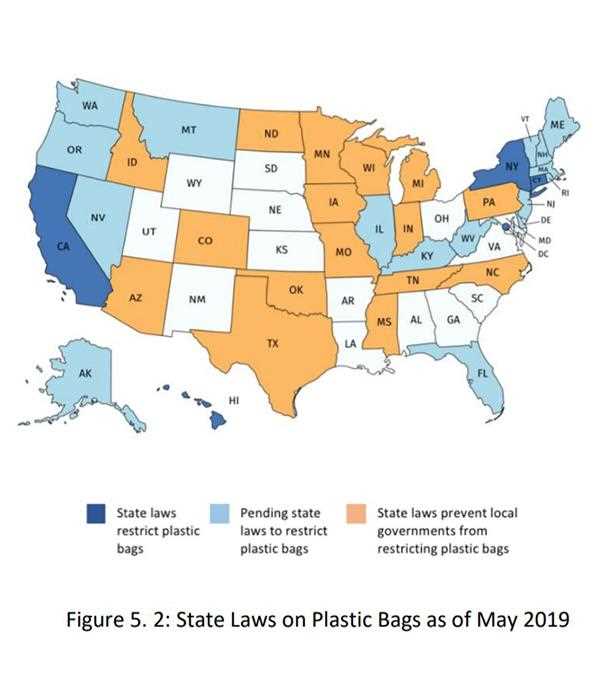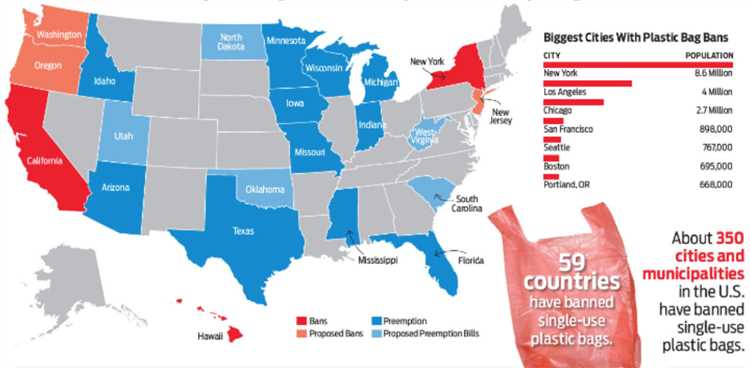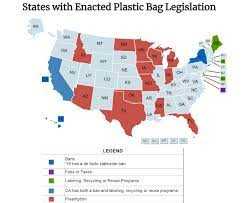
Plastic bags have long been a staple in American households, used for everything from carrying groceries to packing school lunches. However, in recent years, there has been a growing concern over the environmental impact of these bags. As a result, several states in the US have taken action by implementing plastic bag bans.
One state that has been at the forefront of this movement is California. In 2014, California became the first state to ban single-use plastic bags. The law, which went into effect in 2016, prohibits grocery stores and other retailers from providing plastic bags to customers at checkout. The goal of the ban is to reduce litter and waste, as well as promote the use of reusable bags.
Another state that has implemented a plastic bag ban is Hawaii. The state, known for its beautiful beaches and pristine natural landscapes, has long been concerned about the impact of plastic pollution on its ecosystems. In 2015, Hawaii became the first state to ban plastic bags at checkout. The ban applies to all businesses, including grocery stores, pharmacies, and even restaurants.
Other states that have joined the movement to ban plastic bags include New York, Oregon, and Vermont. These states have implemented similar bans, with the aim of reducing plastic waste and promoting the use of more sustainable alternatives. The bans typically apply to large retailers, but some also include smaller businesses.
- Importance of limiting plastic bag use
- States that have banned plastic bags
- California
- New York
- Hawaii
- Oregon
- Connecticut
- Maine
- California
- Implementation Challenges
- Positive Impact
- Oregon
- Connecticut
- New York
- Implementation of the Ban
- Enforcement and Penalties
- Hawaii
- Impact of the Ban
- Challenges and Future Steps
- Rhode Island
- Impact of the Ban
- Exceptions to the Ban
- Q&A:
- Which states in the US have banned plastic bags?
- What was the reason behind banning plastic bags?
- Are there any exemptions to the plastic bag ban?
- Have there been any positive impacts of the plastic bag ban?
- Are there any penalties for violating the plastic bag ban?
- Which US states have banned plastic bags?
- Why have these states decided to ban plastic bags?
Importance of limiting plastic bag use
The problem of plastic pollution has become a growing concern across the globe. Plastic bags are one of the major contributors to this issue, as they are often disposed of improperly and end up in landfills or waterways.
Reducing the use of plastic bags is crucial for several reasons:
- Environmental impact: Plastic bags take hundreds of years to decompose, leading to long-term pollution of the environment. They can harm wildlife, clog waterways, and contribute to habitat destruction.
- Conservation of resources: The production of plastic bags requires significant amounts of energy and natural resources, including fossil fuels. By limiting their use, we can conserve these valuable resources.
- Health risks: Plastic bags can release harmful chemicals when they break down, posing potential health risks to humans and animals.
Switching to reusable bags is a simple but effective way to reduce our reliance on single-use plastic bags. Reusable bags are made from durable materials such as cotton or canvas and can be used repeatedly, reducing waste and saving resources.
Many states in the US have recognized the importance of limiting plastic bag use and have implemented bans or restrictions on their distribution. By taking such measures, we can protect our environment, conserve resources, and create a healthier future for generations to come.
States that have banned plastic bags
Plastic pollution is a growing concern all over the world, and many states in the US have taken action by implementing bans on single-use plastic bags. These bans aim to reduce the environmental impact of plastic waste and promote the use of reusable alternatives. Here are some states that have implemented plastic bag bans:
California
California was the first state in the US to implement a statewide ban on single-use plastic bags. The ban became effective in 2016 and prohibits the distribution of plastic bags at most retail stores, with certain exceptions.
New York
New York implemented a ban on single-use plastic bags in 2020. The ban applies to most retail stores, including grocery stores, and encourages the use of reusable bags.
Hawaii
Hawaii has banned single-use plastic bags since 2015. The ban applies to all counties and prohibits the distribution of plastic bags at most retail establishments.
Oregon
Oregon implemented a ban on single-use plastic bags in 2020. The ban applies to most retail stores and encourages the use of reusable bags instead.
Connecticut
Connecticut implemented a ban on single-use plastic bags in 2021. The ban applies to most retail stores and aims to reduce plastic waste and promote sustainable alternatives.
Maine
Maine has banned single-use plastic bags since 2020. The ban applies to most retail establishments and encourages the use of reusable bags.
These states are leading the way in reducing plastic waste and promoting environmentally-friendly practices. The bans on single-use plastic bags are just one step towards a more sustainable future, and it is hoped that other states will follow suit in the years to come.
California
California became the first state in the United States to ban single-use plastic bags. In 2014, Governor Jerry Brown signed the Senate Bill 270, which prohibited large grocery stores and pharmacies from providing single-use plastic bags to their customers. The ban was later expanded to include convenience stores and other retailers.
The goal of the ban is to reduce plastic pollution and protect marine and terrestrial wildlife. Single-use plastic bags are known to be a major source of litter and can take hundreds of years to decompose. By banning these bags, California aims to encourage the use of reusable bags and promote environmentally-friendly alternatives.
Implementation Challenges
The ban on plastic bags faced some opposition and challenges. The plastic bag industry, along with some retailers, campaigned against the ban, arguing that it would lead to job losses and an increase in the use of paper bags, which also have environmental impacts.
Additionally, there were concerns about the availability and affordability of reusable bags for low-income communities. To address this issue, the law requires stores to offer reusable bags at a low cost or provide them for free to customers who participate in certain welfare programs.
Positive Impact
Despite these challenges, the ban in California has had a significant positive impact. Studies have shown a significant reduction in the use of single-use plastic bags since the implementation of the ban. This has led to a decrease in plastic litter on beaches, in rivers, and in other natural habitats.
Furthermore, the ban has sparked a shift in consumer behavior, encouraging more people to bring their own reusable bags when shopping. This change has not only helped reduce plastic pollution but has also created a culture of sustainability and environmental consciousness among Californians.
In conclusion, California’s ban on plastic bags has been a pioneering step in the United States’ efforts to reduce plastic waste. The state has set an example for other states to follow, and several have since implemented similar bans. With continued efforts and awareness, we can work towards a more sustainable future and protect our environment for generations to come.
Oregon
Oregon is one of the states in the US that has banned plastic bags. The ban was implemented in 2019 and is aimed at reducing plastic waste and promoting environmental sustainability. Under the ban, retailers are prohibited from providing single-use plastic bags to customers at the point of sale.
Instead of plastic bags, Oregon encourages the use of reusable bags or paper bags made from recycled materials. Retailers are allowed to provide paper bags to customers but must charge a fee of $0.05 per bag. This fee is intended to encourage people to bring their own bags and reduce unnecessary waste.
The ban on plastic bags in Oregon applies to all retail establishments, including grocery stores, convenience stores, and other retailers. There are some exceptions to the ban, such as bags used for bulk items, meat, produce, and prescription drugs. Additionally, people who are on government assistance programs, such as the Supplemental Nutrition Assistance Program (SNAP), are exempt from the bag fee.
Oregon’s ban on plastic bags is part of a larger effort to reduce plastic pollution and protect the environment. By encouraging the use of reusable bags and reducing reliance on single-use plastics, Oregon is taking steps towards a more sustainable future.
Connecticut

Connecticut is one of the states in the US that has banned plastic bags. The ban on single-use plastic bags took effect on August 1, 2021. This ban applies to both grocery stores and retail establishments.
The aim of this ban is to reduce the environmental impact of plastic bags, particularly their contribution to litter and their harmful effects on wildlife. By encouraging the use of reusable bags, Connecticut hopes to decrease the amount of plastic waste that ends up in landfills and waterways.
Under the ban, retailers are required to provide customers with reusable bags or recyclable paper bags. However, customers are also encouraged to bring their own reusable bags when they go shopping. This will not only help reduce plastic waste but also save consumers money, as they will not have to pay for bags provided by retailers.
It’s worth noting that Connecticut is not the only state to have implemented a plastic bag ban. Several other states, such as California, New York, and Hawaii, have also taken similar actions in an effort to protect the environment and promote sustainable practices.
The ban on plastic bags in Connecticut is not only a step towards a greener future but also a reminder of the importance of individual responsibility in preserving the environment.
New York
New York is one of the states in the US that has banned plastic bags. The ban was signed into law by Governor Andrew M. Cuomo in April 2019 and went into effect on March 1, 2020.
The ban applies to single-use plastic bags provided by grocery stores, supermarkets, convenience stores, and other retail establishments. However, there are some exceptions to the ban, including bags used for certain items such as raw meat, fish, bulk items, and prescription drugs.
New York’s ban on plastic bags is aimed at reducing plastic waste and protecting the environment. Single-use plastic bags are a major source of pollution, causing harm to wildlife and contributing to the buildup of plastic waste in landfills and waterways.
Implementation of the Ban

The implementation of the plastic bag ban in New York has been met with mixed reactions. Some people have embraced the change and have started using reusable bags for their shopping needs. Others, however, have struggled to adjust to the new regulations and have found it inconvenient.
In an effort to assist consumers with the transition, the state has provided funding to distribute reusable bags to low-income communities and encourage the use of alternatives to plastic bags.
Enforcement and Penalties
The enforcement of the plastic bag ban in New York is primarily the responsibility of local governments. The law allows localities to impose civil penalties on businesses that violate the ban, with fines ranging from $250 to $500 for the first offense, and up to $1000 for subsequent offenses.
| Violation | Penalty |
|---|---|
| First offense | $250 |
| Subsequent offenses | Up to $1000 |
It is important for businesses and consumers in New York to familiarize themselves with the regulations and comply with the ban on plastic bags to avoid penalties.
Hawaii
Hawaii is one of the states in the US that has banned plastic bags. The ban was implemented in 2015, making Hawaii the first state in the country to take such action.
The ban applies to all counties in Hawaii, including Honolulu County, Maui County, Kauai County, and Hawaii County. It prohibits the distribution of non-biodegradable plastic bags at checkout counters of commercial establishments.
The main motivation behind the ban is the preservation of Hawaii’s unique environment, including its marine life and beautiful beaches. Plastic bags have been found to pose a significant threat to the fragile ecosystems and wildlife of the state.
With the ban in place, consumers in Hawaii are encouraged to use reusable bags instead of plastic. Many stores offer reusable bags for purchase, and some even provide incentives for customers who bring their own bags.
Impact of the Ban
Since the ban took effect, there has been a noticeable decrease in the use of plastic bags in Hawaii. This has resulted in less plastic waste entering the state’s landfills and waterways.
The ban has also led to an increase in awareness about the effects of plastic pollution and the need for sustainable alternatives. Many individuals and organizations in Hawaii have taken further steps to reduce their plastic consumption, such as using reusable water bottles and utensils.
Challenges and Future Steps
While the ban on plastic bags in Hawaii has been successful in reducing their usage, there are still challenges that need to be addressed. There is a need for further education and outreach to ensure widespread adoption of reusable bags and other sustainable options.
In addition, there is a growing concern about the use of other single-use plastics, such as straws and styrofoam containers. Efforts are being made to introduce legislation that would address these issues and further reduce plastic waste in Hawaii.
Overall, Hawaii’s ban on plastic bags serves as a model for other states and countries looking to tackle the problem of plastic pollution. The state’s commitment to protecting its environment and promoting sustainability is an inspiration for others to follow.
Rhode Island
Rhode Island is one of the states in the US that has banned plastic bags. The ban on single-use plastic bags went into effect on November 1, 2019. This ban applies to retailers and grocery stores across the state.
The aim of the ban is to reduce plastic pollution, protect the environment, and encourage the use of reusable bags. Rhode Island has joined other states in taking a proactive step toward reducing the impact of plastic on our ecosystems.
Impact of the Ban
Since the implementation of the ban, Rhode Islanders have had to adjust to using alternative options to carry their purchases. This has led to an increase in the use of reusable bags, paper bags, and other eco-friendly alternatives.
The ban has also promoted public awareness about the harmful effects of plastic bags on the environment. It has encouraged residents to adopt more sustainable practices and make conscious choices when it comes to shopping and waste management.
Exceptions to the Ban
While the ban applies to most retailers and grocery stores, there are a few exceptions. Some of these exceptions include bags for certain items like meat, fish, and bulk items. Additionally, bags used for prescriptions, take-out food, and dry cleaning are also exempt from the ban. However, retailers are encouraged to use alternative options whenever possible, even for exempt items.
It is important to note that while the ban on plastic bags is a step in the right direction, there is more work to be done in Rhode Island and across the nation to address the issue of plastic pollution. Efforts to reduce single-use plastics, promote recycling, and educate the public about sustainable practices are ongoing.
Q&A:
Which states in the US have banned plastic bags?
As of now, there are 8 states in the US that have banned plastic bags. They are California, Connecticut, Delaware, Hawaii, Maine, New York, Oregon, and Vermont.
What was the reason behind banning plastic bags?
The main reason behind banning plastic bags is to reduce environmental pollution. Plastic bags are non-biodegradable and take hundreds of years to decompose. They pose a significant threat to wildlife and can clog waterways and contribute to flooding. Banning plastic bags encourages the use of reusable bags and promotes a more sustainable lifestyle.
Are there any exemptions to the plastic bag ban?
Yes, there are exemptions to the plastic bag ban in some states. These exemptions usually include bags used for fruits, vegetables, meat, frozen foods, and prescriptions. Additionally, small businesses may be exempted from the ban in certain cases.
Have there been any positive impacts of the plastic bag ban?
Yes, the plastic bag ban has had several positive impacts. It has led to a significant reduction in plastic bag usage and waste. This has helped in preserving natural resources and reducing pollution. Additionally, the ban has encouraged the use of reusable bags, which are more durable and eco-friendly.
Are there any penalties for violating the plastic bag ban?
Yes, there are penalties for violating the plastic bag ban in some states. The exact penalties vary depending on the state and can include fines and warnings. It is important for businesses and individuals to comply with the ban to avoid these penalties and contribute to environmental conservation.
Which US states have banned plastic bags?
Several US states have banned plastic bags, including California, New York, Hawaii, and Oregon. These bans vary in their specifics, with some states implementing a complete ban on all plastic bags and others allowing certain exceptions.
Why have these states decided to ban plastic bags?
The main reason behind the bans on plastic bags is the environmental impact they have. Plastic bags are not biodegradable and can take hundreds of years to break down. They also contribute to litter and pollution, harming wildlife and ecosystems. By banning plastic bags, these states hope to reduce plastic waste and encourage the use of more eco-friendly alternatives.